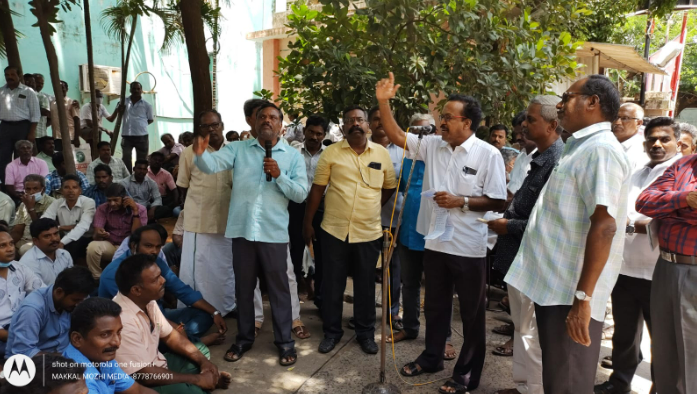Unions Protest BJP Govt’s bid to Privatise Electricity in Puducherry

Electricity workers protest privatisation in UTs. Image courtesy: CITU, Puducherry
In April 2020, Union finance minister Nirmala Sitharaman announced that electricity transmission and distribution would be privatised in all union territories. The reason behind the decision is said to be the loss-incurring electricity distribution in the UTs.
All the trade unions in the electricity departments in Puducherry have formed a joint action committee (JAC) protesting the government’s move as it would have an adverse effect on all sectors.
Around 500 employees of the Puducherry Electricity Department went on a one-day strike on May 23, demanding the Bharatiya Janata Party (BJP)-led central government to withdraw its efforts to privatise the electricity distribution company (discom) in the UT.
The JAC said that if their demand is not met, they will carry out more protests, indefinite strikes, and even a judicial course of action in the future.
BYPASSING THE LEGISLATURE
The JAC has vehemently opposed the argument that the electricity department is running under loss.
Ramasamy, secretary of the CITU in the department, told NewsClick, “The Centre claims that it wants to overcome losses and decided to privatise electricity. Even going by their argument, unlike few other UTs, Puducherry electricity board is running at a profit. So, there is no need to privatise electricity.”
Puducherry Power Corporation Limited, an undertaking owned by the Government of Puducherry, operates a 33 MW gas power plant in the Karaikal region, making the UT self-sustainable.
Ramasamy also said, “In other UTs, there is no elected government like Puducherry. The central government announced to privatise electricity and the implementation of it is already underway without the knowledge of the state government.”
Notably, electricity is under the concurrent list in the Seventh Schedule to the Constitution of India, which empowers both the Centre and states to make laws regarding it.
Under the leadership of the then Congress government in 2020, the assembly passed a resolution to oppose the privatisation of electricity in Puducherry. Except for the BJP, all other members supported the resolution, including members of Dravida Munnetra Kazhagam (DMK) and All India Dravida Munnetra Kazhagam (AIADMK).
“Namasivayam, the electricity department minister, is keen on implementing the privatisation move. On May 9, even without the assembly meeting, minutes were circulated saying the assembly passed the move to privatise electricity in the UT,” said Ramasamy.
Namasivayam was formerly with the Puducherry Pradesh Congress Committee and opposed the privatisation move in 2020.
“Usually, circulation minutes took two to three days; this was done within two hours. Also, this is a policy decision, so passing it without the assembly meeting is unacceptable. It is unusual in the history of Puducherry,” he added.
‘HOW CAN THEY PRIVATISE A DEPT?’
Across the country, since 2003, efforts have been made to unbundle the electricity departments under the state governments, to split it into production, transmission and distribution. This was viewed as a move towards privatising electricity, and there was strong opposition from the trade unions.
In 2007, there was strong opposition to unbundling and making separate corporations of transmission and distribution in Puducherry, which was successful.
However, now the electricity department employees are angered by the move to directly privatise an entire department.
“How can they privatise a whole department in the government? Earlier, they at least attempted to make them into boards and corporations before privatisation was pushed. Now, they are selling off an entire government-run department to the private sector,” Ramasamy said.
REPERCUSSIONS
Currently, the UT purchases per unit of electricity for Rs 5.5 from the Centre and sells it at approximately Rs 6 per unit. Around 450 megawatts of electricity is transmitted to Puducherry.
The JAC believes that there are chances of per unit electricity going up to as high as Rs 10 or Rs 11 if it is privatised.
Moreover, “if electricity is privatised, like in other states such as Orissa, during natural calamities the private company would refuse to provide electricity saying they are not responsible for it,” said Ramasamy.
He added, “In Pondicherry, we ensured that the disruption was sorted within an hour even during cyclones. This was possible only because we are a public department. It took up to two days to rectify electricity disruptions in many states.”
If electricity is privatised, the JAC observed, the benefits of free electricity to the agriculture sector and for people living in slum settlements might be withdrawn.
The committee also added that in the franchise method, many private companies would be given the responsibility of distributing electricity; this would affect the public.
Moreover, there is no job security for the 2,000 employees working in the Electricity Department in the four areas of Puducherry, including Mahe, Yanam and Karaikal. The UT and central government have not spoken about their plight. The rights and benefits of the government employees are also precarious.
Lieutenant-Governor Tamilisai Soundararajan said on May 24 that any decision on the privatisation of the Puducherry Electricity Department will be in the interest of the people and employees.
Get the latest reports & analysis with people's perspective on Protests, movements & deep analytical videos, discussions of the current affairs in your Telegram app. Subscribe to NewsClick's Telegram channel & get Real-Time updates on stories, as they get published on our website.
























